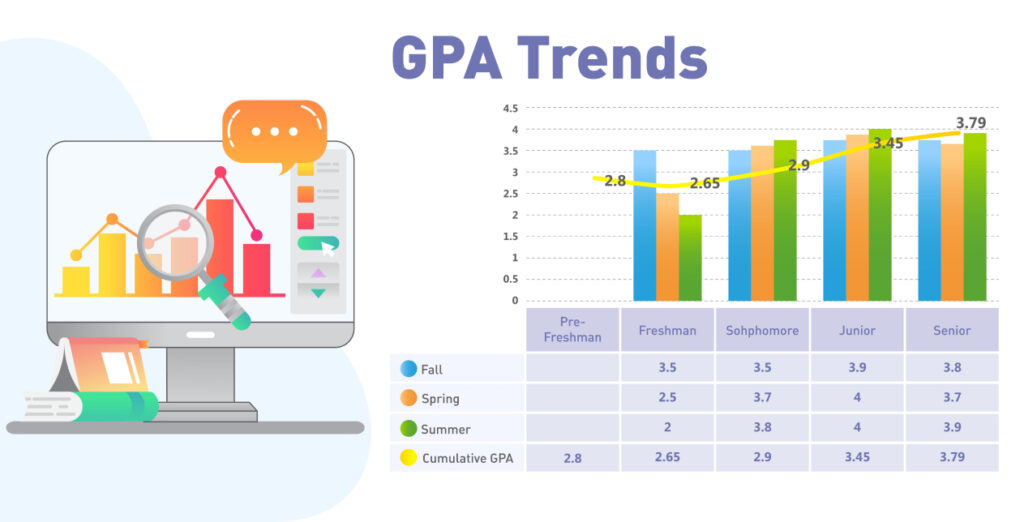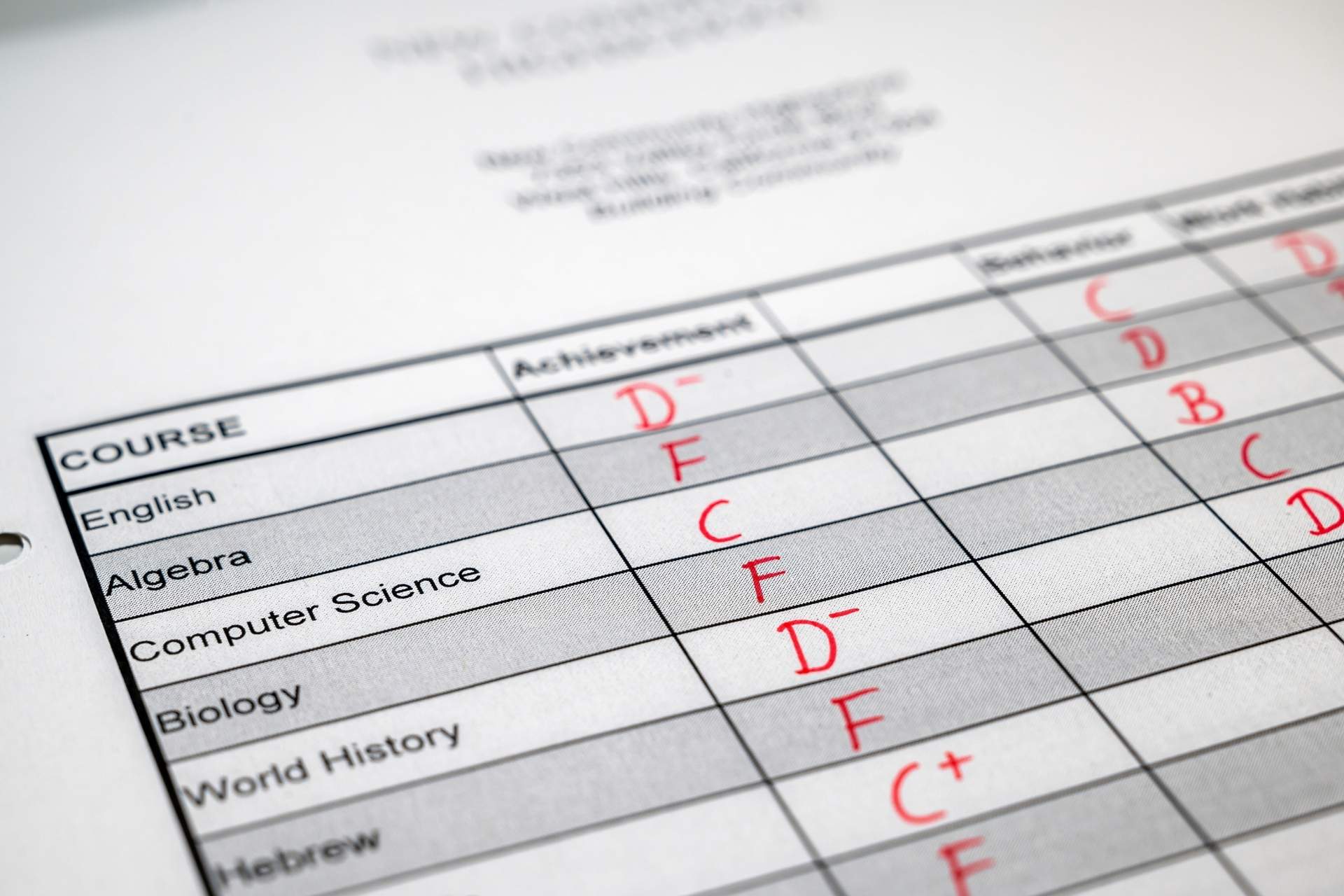If you’re serious about your academic path, you’re going to need to start thinking about your GPA sooner or later, as it happens to be one of the factors that college officials consider when deciding who gets in. Bear in mind that even the best colleges with high acceptance rates in the US have certain standards that students are expected to meet.
However, answering the question “What’s a bad GPA” may not be quite so straightforward. The reason is that the answer can completely change from individual to individual and it’s mostly shaped by that person’s aspirations and goals.
So to give you some kind of framework, let’s first take a look at the concrete numbers to evaluate where you stand. And, if you’re worried your GPA is indeed too low, we’ll also show you how to improve it.
First things first – what GPA scores fall within the national average?
Going purely by the numbers, a low GPA would be something that falls below the average. So if you’re mostly getting a B, your unweighted GPA score would be about a rounded 3.0, which is considered the national average. Note that the school you’re attending may have its own way of calculating GPA, so take it with a grain of salt.
To secure an optimal placement in college, the average GPA to shoot for is much higher and falls within the 3.5-4.0 range. In other words, that’s going to be the average GPA of your competition, as you also need to consider that not all high school students have a desire to enter college. With that being said, there are certain colleges that accept more than 90% of applicants, so technically you could even get in with a GPA as low as 2.0.
What GPA scores are objectively low?
When we say ‘objectively low’, we mean this as a loose term. At the end of the day, whether you perceive your GPA to be either ‘good’ or ‘bad’ mostly depends on your perception and individual goals. But again, going purely by the numbers alone, an objectively low GPA would be anything below a 3.0, as that effectively limits the list of colleges you have a decent shot of getting into. This number is supported by TACT research data.
Let’s suppose you were aiming for one of the colleges with lower requirements. Even so, having a GPA lower than 2.9 would significantly hamper your chances of getting in. But where does it get really bad? That would probably be anything below 2.0. A GPA low signals that you’re facing consistent academic challenges and don’t look good on paper. It certainly won’t convince a college official, nor any potential employer who’s considering hiring you.
The lowest possible GPA
This one is easy to answer – it’s 0.0. Well, it gets slightly more complicated in the sense that this is true for unweighted GPA scores. For practical purposes, this would be a 1.0 or a D average. Bear in mind that a GPA this low can put you in hot waters, as even the most lenient colleges typically have a GPA cutoff range somewhere between 2.0 and 2.5.
Most people’s GPA tends to improve over time
If you’ve faced hardships in high school, perhaps you’re worried about potentially failing a class or somehow lagging behind your peers. To establish whether this is the case or not, we invite you to analyze the following graph:

As you can see, it’s mostly normal for your GPA to take a bit of a hit as you transition from your pre-freshman years to the high school curriculum. In fact, most students experience it as a bump in difficulty (as it should be). If you’ve decided to take on a part-time job or extracurricular activities, you may find yourself with insufficient time for studying, which could impact your GPA even more. Either way, a drop in your GPA could easily set you into panic mode, but once again, kindly refer to the graph above. Chances are that what you’re experiencing is within the range of normal!
To put things in perspective, college officials are quite well acquainted with this graph, so they won’t be too hard on you if you were experiencing temporary setbacks at some point during your high school years. Even if it lasts for two semesters. However, they would certainly like to know whether you were able to overcome these challenges or not. In other words, college officials tend to look at the complete picture of your academic journey, so you have a bit of a leeway in this regard.
Is it possible to get into medical schools with a low GPA?
The consensus is that medical schools tend to look for the cream of the crop, so if you’re not one of these so-called elite students, you could find yourself on the shorter end of the stick. At Novel Prep, we’re observing that medical schools are unlikely to consider a candidate with a GPA lower than 3.0. In fact, it’s recommended to aim for a 3.7 or higher if you want to play it safe.
Well, at least that’s the case if you’re planning to study medicine in the mainland US. Interestingly enough, certain Caribbean medical schools are known to be willing to take on candidates with a GPA as low as 2.0. Bear in mind that your GPA, while important, is not the end-all-be-all of your academic journey and that other factors also play a role, including your:
- Personal statement
- MCAT scores
- Recommendations
So if you want to get into medical school and your GPA happens to be low, our best advice is to focus on other aspects of your application that can tip the scale. You may also want to consider enrolling into credit recovery programs.
How you perceive your GPA mostly boils down to these three factors
The fact of the matter is that different schools have different requirements and different individuals have different goals in life. With that in mind, knowing what a bad GPA is by no means a simple thing to determine, as most of it tends to be subjective. To get a better idea, you should take the following into consideration:
1. Your school of choice
A GPA of 4.0 doesn’t really say much if you can’t classify it as either weighted or unweighted. In other words, there is a difference between a student who gets a certain score in advanced-level classes and one who opts for basic-level classes. Naturally, the students willing to challenge themselves by studying advanced-level materials will be recognized as more qualified, so an advanced-level B might be worth more than a basic-level A. College officials understand this very well, so deliberately taking a lower-level class just so you can get an A won’t be fooling anyone.
Unlike PSAT and SAT, your GPA score is actually not standardized. What this means is that you could technically find yourself in a situation where your teachers are unreasonably harsh and demanding of you, which ultimately reflects on your grades. This can happen, and a GPA of 3.7 at a certain school could easily translate into a 4.0 at another.
2. Advanced-level vs. basic-level classes
A GPA of 4.0 might look impressive, but again, it won’t fool anyone who understands the difference between a weighted and an unweighted GPA score. What do you think is going to be the first thing a college official scrutinizes upon seeing such a score? They’re going to take a look at whether you’ve scored these A grades in a basic-level or advanced-level class. And rest assured that a basic-level A is not nearly as impressive as getting an A grade in one of the latter types of classes.
Then again, you have to balance this out with the fact that, strategically, opting to take every hardest class might not be the best route to take – this would quickly get overbearing! Then again, if you have a special interest or a subject you’d like to potentially pursue as one of your college majors, you should strongly consider broadening your horizons and challenging yourself by taking the advanced-level class on it.
Yes, there is a real risk of not performing well and consequently lowering your GPA as a result, but it’s worth it in the end. Remember that college officials highly value a candidate who’s willing to challenge oneself. So in other words, don’t think of your GPA as a mere number, but rather in terms of the story it tells. Is it one of facing adversity with bravery and having a willingness to take on a challenge? That’s the kind of story that speaks volumes about your character.
3. Your academic goals
If you’re aiming for Harvard or Ivy League, you can pretty much forget about it with a low GPA. In cases like these, keep in mind your competition is going to have a GPA above 3.75 – why should college officials even bother to look at your application? After all, there is only a limited number of spots available.
In essence, a lot of whether your GPA can be considered low comes down to the kind of colleges you’re aiming to get into – examining their historical averages should give you a solid base point. Keep in mind the threshold can fluctuate over the years, so in some years, an under-average GPA could get you through, while in others, what would typically be an above-average GPA might not cut it.
Colleges that allow you to bypass the GPA system
Once again, we need to emphasize that your GPA is not the end-all-be-all of your academic qualifications. In fact, every person has different things to bring to the table, and certain colleges want to give you a chance to shine in other, perhaps slightly less conventional ways. Examples include:
- Bennington College. They won’t even ask you to submit a transcript or your test scores. Instead, you’ll need to submit a self-curated collection of your work that showcases your creative and intellectual abilities in the best possible light.
- Bard College. Unlike Bennington College, you will need a transcript for this one. However, your SAT score won’t be a factor. Instead, they have their own system of qualifying their applicants by asking them to write an essay in either Social Studies, Science, Arts, or Languages and Literature.
A step-by-step guide on how to figure out whether your GPA is ‘good’ or ‘bad’
Now that we’ve gotten the essentials out of the way and you know how to contextually evaluate your GPA score, here’s a simple step-by-step system you can use to determine whether it aligns with your academic goals:
- Short-list the colleges you’d like to attend.
- Go through the list and check the admission rates for each of the colleges.
- Compare your GPA to the average GPA of your chosen school (keep in mind that most of them will give you unweighted scores).
- Evaluate where you stand and adjust your habits and strategy if needed.
Tips on how to craft a strong college application with a low GPA
Worried that your GPA won’t look good on paper? As we’ve said many times before, you can bring your other qualities to the forefront (yes, college officials consider these as well). It all comes down to how well you can craft your college application. At Novel Prep, we’ve observed our students are getting the best results when they focus on the following:
- Achievements. If you’ve been focusing on extracurricular activities, you may have other skills that fall outside the scope of traditional schoolwork. Don’t be shy and highlight them! Whether it be sports, volunteering, or leadership, these are valuable skills our world needs more of.
- Letters of recommendation. Typically, you can get these from your teachers, but it can also be an employer or mentor. A letter like this carries a considerable amount of weight in the application process.
- Personal statement. This is a golden opportunity to tell the story of your life, so capitalize on it. Outline the lessons you’ve learned, the hardships you’ve faced along the way, and convey your determination to succeed in life.
- Self-reflection. An academic journey is all about overcoming obstacles and fostering personal growth that can oftentimes come as a result of taking a deep dive into oneself. Sometimes, a low GPA can spark personal growth far more easily than a GPA that leaves nothing to be desired.
- A portfolio of projects. Are you a creative type? Were you involved in a research project? Showcase your accomplishments and you will demonstrate your potential.
Your GPA is not set in stone! Here’s how to improve it
If you’ve determined that a higher GPA is going to be necessary for you to get where you want to be, the good news is that there are ways to improve it! The younger you are, the easier this tends to be. At any rate, if you’re willing to put in the time it takes to improve it, results are bound to follow. Consider doing the following:
- Take harder classes. While there is a legitimate risk of your GPA actually dropping this way, at least on paper, it’s the best bet you can take if you want to impress college officials who like to see candidates who possess the willingness to overcome obstacles and stay strong in the face of adversity. For obvious reasons, don’t do this if you’re already struggling with the basic-level coursework, in which case you’d be shooting yourself in the foot.
- Keep your focus on your priorities and develop a studying habit. If you want to improve your GPA, forget about taking shortcuts – there are none. If you’re dealing with procrastination, learn how to overcome it. As a general rule of thumb, it’s always better to accomplish something today than to postpone it. The light at the end of the tunnel is in the sense that it all gets easier once you’ve managed to make this a habit and you naturally gravitate towards it as opposed to having to give it a conscious thought.
- Start working with a tutor. One of the most disheartening things in your academic journey is condemning yourself to having to figure out everything on your own. In reality, it doesn’t have to be this way! At Novel Prep, we’ve designed our high school tutoring services to make them as personalized and student-focused as possible. Our tutors have long years of experience working with high school students just like you, which allows them to quickly identify exactly what it is that you’re struggling with so that you can work on filling the gaps in your knowledge, whether it be Math, Science, Social Studies, English or in any other subject. We are willing to accommodate your schedule, no matter how busy it may be, so we invite you to give it a shot!
Everything considered, what’s a bad GPA?
We’ve given you some concrete numbers to work with, but the numbers alone don’t do a good job of painting the complete picture. In reality, what a certain student might view as a ‘bad’ GPA could be perfectly fine for someone else. At the end of the day, it comes down to your unique personal circumstances and academic goals.
The emphasis is to make them attainable – as in being realistic about where you stand and what the requirements of your desired college appear to be. And if you’re willing to pour the time and energy necessary to improve your situation, contact our Novel Prep advisors! We’re happy to give you an honest assessment of your current situation and help you set a reasonable and realistic goal.



